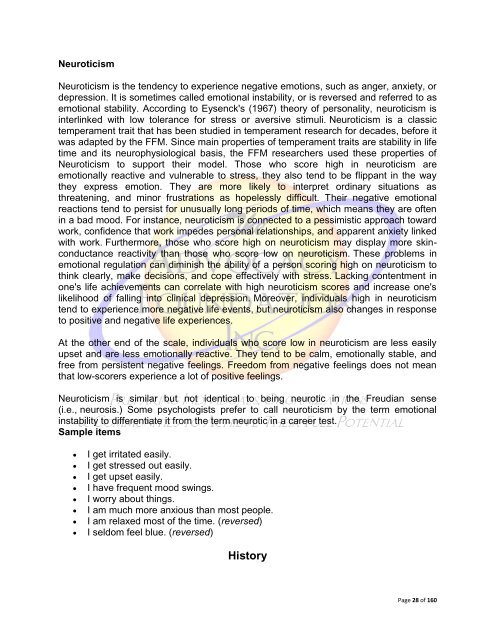The Gift of Introversion
The Gift of Introversion
The Gift of Introversion
You also want an ePaper? Increase the reach of your titles
YUMPU automatically turns print PDFs into web optimized ePapers that Google loves.
Neuroticism<br />
Neuroticism is the tendency to experience negative emotions, such as anger, anxiety, or<br />
depression. It is sometimes called emotional instability, or is reversed and referred to as<br />
emotional stability. According to Eysenck's (1967) theory <strong>of</strong> personality, neuroticism is<br />
interlinked with low tolerance for stress or aversive stimuli. Neuroticism is a classic<br />
temperament trait that has been studied in temperament research for decades, before it<br />
was adapted by the FFM. Since main properties <strong>of</strong> temperament traits are stability in life<br />
time and its neurophysiological basis, the FFM researchers used these properties <strong>of</strong><br />
Neuroticism to support their model. Those who score high in neuroticism are<br />
emotionally reactive and vulnerable to stress, they also tend to be flippant in the way<br />
they express emotion. <strong>The</strong>y are more likely to interpret ordinary situations as<br />
threatening, and minor frustrations as hopelessly difficult. <strong>The</strong>ir negative emotional<br />
reactions tend to persist for unusually long periods <strong>of</strong> time, which means they are <strong>of</strong>ten<br />
in a bad mood. For instance, neuroticism is connected to a pessimistic approach toward<br />
work, confidence that work impedes personal relationships, and apparent anxiety linked<br />
with work. Furthermore, those who score high on neuroticism may display more skinconductance<br />
reactivity than those who score low on neuroticism. <strong>The</strong>se problems in<br />
emotional regulation can diminish the ability <strong>of</strong> a person scoring high on neuroticism to<br />
think clearly, make decisions, and cope effectively with stress. Lacking contentment in<br />
one's life achievements can correlate with high neuroticism scores and increase one's<br />
likelihood <strong>of</strong> falling into clinical depression. Moreover, individuals high in neuroticism<br />
tend to experience more negative life events, but neuroticism also changes in response<br />
to positive and negative life experiences.<br />
At the other end <strong>of</strong> the scale, individuals who score low in neuroticism are less easily<br />
upset and are less emotionally reactive. <strong>The</strong>y tend to be calm, emotionally stable, and<br />
free from persistent negative feelings. Freedom from negative feelings does not mean<br />
that low-scorers experience a lot <strong>of</strong> positive feelings.<br />
Neuroticism is similar but not identical to being neurotic in the Freudian sense<br />
(i.e., neurosis.) Some psychologists prefer to call neuroticism by the term emotional<br />
instability to differentiate it from the term neurotic in a career test.<br />
Sample items<br />
<br />
<br />
<br />
<br />
<br />
<br />
<br />
<br />
I get irritated easily.<br />
I get stressed out easily.<br />
I get upset easily.<br />
I have frequent mood swings.<br />
I worry about things.<br />
I am much more anxious than most people.<br />
I am relaxed most <strong>of</strong> the time. (reversed)<br />
I seldom feel blue. (reversed)<br />
History<br />
Page 28 <strong>of</strong> 160

















